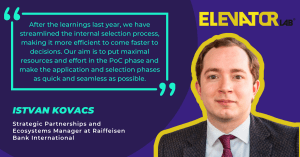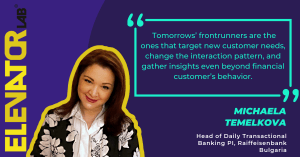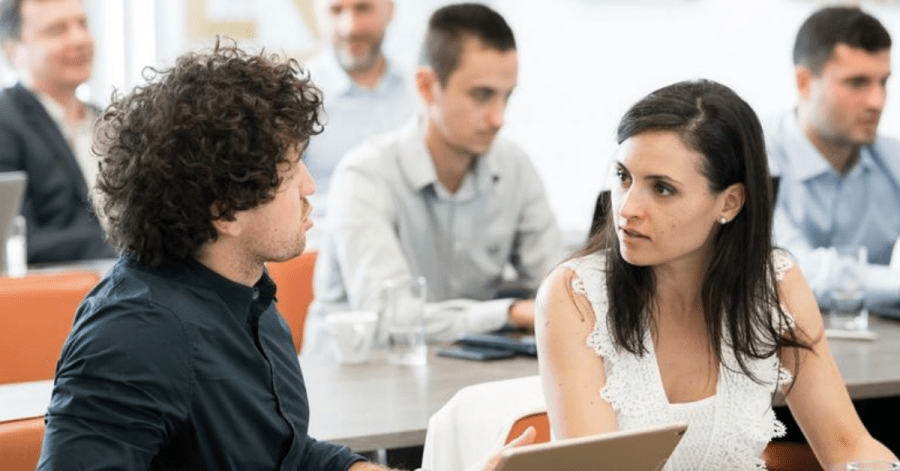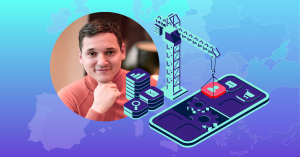Scaling fintech companies from all over the world can now apply in the new season of the biggest corporate partnership program in the CEE region, organized by Raiffeisen Bank International (RBI). Elevator Lab is the corporate fintech program of the RBI Group that supports the development of scale-ups by providing them with experienced mentors and access to real business cases. This year, one of the tracks of the Elevator Program will be done in partnership with Raiffeisenbank Bulgaria and will be focused on validating the proof of concept of fintech solutions in the fields of Digital Customer Acquisition and Financial Health/Literacy.
One winner out of the two dedicated topics of the program will have the opportunity to do a paid proof of concept (PoC) with the Bulgarian subsidiary of RBI. This will be the fintech with the solution that has the biggest potential to validate its viability for Raiffeisenbank in Bulgaria. Experts and financial specialists from both the international and Bulgarian teams of the bank will assist the founders in conducting the validation tests. Upon completing a successful PoC in the Bulgarian subsidiary bank, the startups will have the chance to integrate / will be evaluated to scale up their solution in other banks, part of the RBI Group.
Applications will be open until the 26th of September and after the selection phase, which will consist of remote video pitches and a finalist event where one of the handful finalists will be selected to run the PoC. The Recursive met with some of the RBI innovators who will guide the founders in the PoC process to learn more about the goal and the benefits of the Elevator Lab program.
The fast track for fintech scaling
Taking place from December 2021 to April 2022, the 5-month program will provide the chosen fintech the chance to work towards a pre-defined goal in the PoC and reach some tangible as well as measurable results that could be a basis for a potential long-term cooperation and scaling in the RBI Group. During the PoC the fintech will not only get to work with banking and technical experts of the local Bulgarian subsidiary and RBI experts, but also their efforts, as well as potential travel costs, will be paid too.
In the end, the equity-free PoC program will conclude with an International Demo Day which would position the fintech companies as innovative and give them exposure to the rest of the subsidiary banks and the top management of RBI Group.

Istvan Kovacs notes that the ultimate goal of the Elevator Lab program is to build up long-term, mutually beneficial partnerships between the RBI Group and fintech startups. “The main advantage Elevator Lab offers is that we regard fintech startups as our potential partners right from the start. This means that the chosen fintech startup will get a chance to work on a structured 5 months long Proof of Concept that is not only paid but also offers the possibility to work with senior technical and business experts, they will get access to the bank’s IT infrastructure as well as a possibility of scaling up the solution in multiple countries,” he explains.
According to Yoanna Genova, Raiffeisenbank Bulgaria has a strong commitment to making innovation happen. The team of mentors that takes part in the Elevator Lab Program changes every year according to the topic that is being prioritized by the relevant business line. “This year’s winner will have the opportunity to work with some of the best experts in Bulgaria with 30+ years of banking experience and a track record of successful innovation initiatives: Game of Thrones branded cards, Pay-By-Face, Mobile channel development, agile and design thinking work mode,” Genova says.
And when it comes to ensuring a cross-country collaboration in times of a pandemic, the RBI innovators highlight that the program will be fully digital and will have all the necessary tools to enable seamless and real-time communication as well as a secure exchange of data. “Even in the same company we have been working remotely for 1,5 years successfully, so this has become (remote) business as usual,” Kovacs points out.
“This is valid for Raiffeisenbank Bulgaria too,” says Yoanna Genova, Business Analyst Innovations at Raiffeisenbank Bulgaria. “We have adopted this remote way of working but still if we have the chance, we would love to invite the winning startup personally for a get-together.”
She shares that this year there have been some novelties introduced to the program. For example, in previous years the Bulgarian subsidiary had a strong record of running local Elevator Lab Challenges with an exclusive focus on the Bulgarian ecosystem.

Staying connected with customers and providing them with value-added services
The final dedicated focus areas this year, Digital Customer Acquisition and Financial Health/Literacy have a target group of millennials and young customers who use digital channels and are aimed at improving customer acquisition. Michaela Temelkova, Head of Daily Transactional Banking, and Tzvetelina Petkova, Product Owner of Digital Customer Acquisition, at Raiffeisenbank Bulgaria, explain in detail why the two topics are of interest and importance to the bank.
“With more than 4.5B people using the Internet worldwide without a doubt in 2021 digital customer acquisition is the tool to build a scalable business. Bulgaria is not an exception – more than 4.9M are using the Internet and more than 4.3M are active in social media, so we surely should find a new way to get in touch with all these potential customers,” they share. Moreover, according to them, nowadays it is essential to position the bank as a trusted partner not only for financial service but at the center of most daily customer activities.

“If the last year and Covid crisis taught us something, it’s that we never know what can happen and anyone can find himself in a difficult situation… and that is what financial literacy is about,” they continue. “Financial literacy can benefit consumers of all ages and income levels, and the good level of financial education always affects the quality of life in a positive way. It provides an understanding of what is needed to achieve a lifestyle that is financially balanced, sustainable, ethical, and responsible. In simple words, customers could find the answers to how to pay their bills, how to borrow and invest money responsibly, and how to save for retirement. Financial literacy is important because it equips us with the knowledge and skills that we need to manage money effectively on a daily basis,” Temelkova concludes.
According to Istvan Kovacs, the topic chosen for the Bulgarian track is relevant for the entire RBI Group, because the digitalization of sales and services is crucial for onboarding new clients as well as increasing customer satisfaction. Additionally, he notes that RBI always strives to inform its clients so that they can make the best financial decisions for themselves, and this is exactly where the topic of Financial Literacy plays a great role.
“The topic relevance for the entire RBI Group gives a great chance for the Bulgarian startups that apply in the program to scale up and gain group-wide visibility. Throughout the years we have developed a strong network for best practice sharing and this has been a strong base for the introduction of many group-level solutions such as Moxtra, Pisano, and others,” Yoanna Genova adds.








